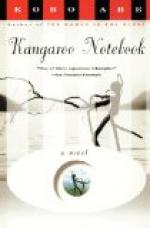|
This section contains 639 words (approx. 3 pages at 300 words per page) |

|
SOURCE: Iwamoto, Yoshio. Review of Kangaroo Notebook, by Kōbō Abé. World Literature Today 71, no. 1 (winter 1997): 228.
In the following review, Iwamoto offers a mixed assessment of Kangaroo Notebook.
Kobo Abe's last novel before his death in 1993, Kangaroo Notebook, originally published in Japanese in 1991, refigures with imaginative vigor those ingredients that have become trademarks in the novelist-playwright's works: metamorphosis, the theme of alienation and the problem of personal identity, and the journey motif through a labyrinthine modern dystopia. In this world fantastic elements coexist with all-too-real features in an exasperating and unnerving amalgam, and humor, albeit of the darkest sort, mitigates the often absurd, frightening, and incomprehensible incidents that occur.
As in many other Abe novels, the “hero” of Kangaroo Notebook, the first-person narrator of the story, remains nameless, suggesting perhaps Everyman and/or a lack of individuality; and the backdrop for the narrative, while containing certain peculiarly Japanese...
|
This section contains 639 words (approx. 3 pages at 300 words per page) |

|


